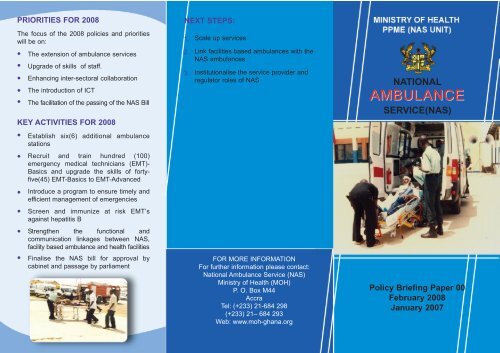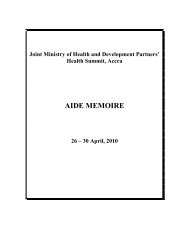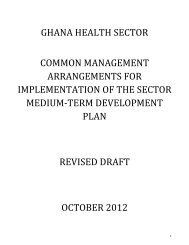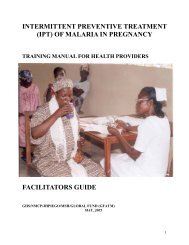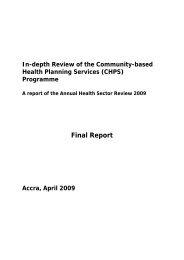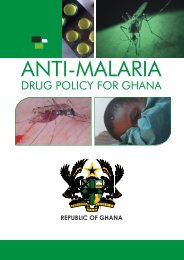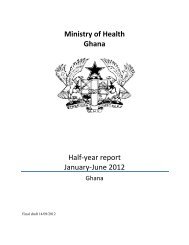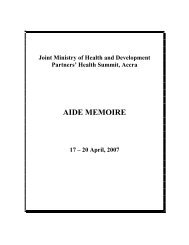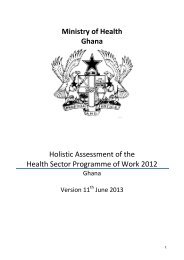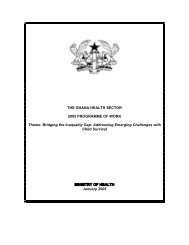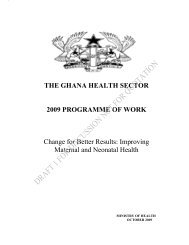National Ambulance Service - Ministry of Health
National Ambulance Service - Ministry of Health
National Ambulance Service - Ministry of Health
Create successful ePaper yourself
Turn your PDF publications into a flip-book with our unique Google optimized e-Paper software.
PRIORITIES FOR 2008<br />
The focus <strong>of</strong> the 2008 policies and priorities<br />
will be on:<br />
<br />
<br />
<br />
<br />
<br />
The extension <strong>of</strong> ambulance services<br />
Upgrade <strong>of</strong> skills <strong>of</strong> staff.<br />
Enhancing inter-sectoral collaboration<br />
The introduction <strong>of</strong> ICT<br />
The facilitation <strong>of</strong> the passing <strong>of</strong> the NAS Bill<br />
KEY ACTIVITIES FOR 2008<br />
NEXT STEPS:<br />
1.<br />
2.<br />
3.<br />
Scale up services<br />
Link facilities based ambulances with the<br />
NAS ambulances<br />
Institutionalise the service provider and<br />
regulator roles <strong>of</strong> NAS<br />
NATIONAL<br />
AMBULANCE<br />
SERVICE(NAS)<br />
<br />
Establish six(6) additional ambulance<br />
stations<br />
<br />
Recruit and train hundred (100)<br />
emergency medical technicians (EMT)-<br />
Basics and upgrade the skills <strong>of</strong> fortyfive(45)<br />
EMT-Basics to EMT-Advanced<br />
<br />
Introduce a program to ensure timely and<br />
efficient management <strong>of</strong> emergencies<br />
<br />
Screen and immunize at risk EMT’s<br />
against hepatitis B<br />
<br />
Strengthen the functional and<br />
communication linkages between NAS,<br />
facility based ambulance and health facilities<br />
<br />
Finalise the NAS bill for approval by<br />
cabinet and passage by parliament<br />
FOR MORE INFORMATION<br />
For further information please contact:<br />
<strong>National</strong> <strong>Ambulance</strong> <strong>Service</strong> (NAS)<br />
<strong>Ministry</strong> <strong>of</strong> <strong>Health</strong> (MOH)<br />
P. O. Box M44<br />
Accra<br />
Tel: (+233) 21-684 298<br />
(+233) 21– 684 293<br />
Web: www.moh-ghana.org<br />
Policy Briefing Paper 00<br />
February 2008<br />
January 2007
BACKGROUND<br />
The medical emergencies and disasters that<br />
have occurred over the years have strongly<br />
highlighted the need for Ghana to initiate an<br />
Emergency Medical service. In 1999<br />
President Kufour in his Sessional Address<br />
emphasized the urgent need for ambulance<br />
services as part <strong>of</strong> the emergency response<br />
system .<br />
In May 9th 2001, the necessity became<br />
unfortunately clear with the Accra Sports<br />
stadium disaster, in which 126 people lost<br />
their lives.<br />
Thus in 2004 the <strong>Ministry</strong> <strong>of</strong> <strong>Health</strong> (MOH) in<br />
collaboration with the <strong>Ministry</strong> <strong>of</strong> Interior<br />
established the seven (7) pilot ambulance<br />
stations.<br />
AIMS<br />
The core mandate <strong>of</strong> <strong>National</strong> <strong>Ambulance</strong><br />
<strong>Service</strong>, (NAS), is to provide efficient and<br />
timely pre-hospital emergency medical care to<br />
the sick and the injured and transport them<br />
safely to health facilities.<br />
ACHIEVEMENTS OF NATIONAL<br />
AMBULANCE SERVICE<br />
Currently NAS has twenty-four stations with<br />
two control rooms in the country. At present,<br />
the coverage <strong>of</strong> ambulance services is limited<br />
to regional capitals and a few districts.<br />
The operation <strong>of</strong> NAS have started with the<br />
provision <strong>of</strong> basic care by the Emergency and<br />
Medical Technicians (EMT’s) basic. It is hoped<br />
that very soon they will be upgraded to EMT<br />
advanced or intermediate to be able to<br />
provide more advanced care.<br />
NAS has collaborated with other stakeholders<br />
including: Ghana <strong>Health</strong> <strong>Service</strong>, and other<br />
emergency service providers to upgrade the<br />
skills <strong>of</strong> staff to current standards.<br />
NAS has provided new ambulances to all<br />
ambulance stations nationwide and some<br />
health facilities to support emergency delivery<br />
in the country.<br />
TO date NAS has trained 243 emergency<br />
medical technicians to man its operations.<br />
EQUIPMENT AND LOGISTICS<br />
In general, some equipment and logistics are in<br />
place at the <strong>National</strong>, Regional, and the District<br />
levels but they remain inadequate based upon<br />
the extensive nature <strong>of</strong> the service provider to<br />
cover various health posts nationwide. <strong>Ministry</strong><br />
<strong>of</strong> <strong>Health</strong> is however making strenuous efforts<br />
to provide the needed logistics and equipments<br />
for the smooth running <strong>of</strong> the <strong>National</strong><br />
<strong>Ambulance</strong> <strong>Service</strong>.<br />
CHALLENGES<br />
In spite <strong>of</strong> the efficient and timely delivery <strong>of</strong><br />
emergency services to the injured and the<br />
sick, NAS has some key challenges:<br />
<strong>Service</strong> Delivery<br />
<br />
<br />
<br />
Lack <strong>of</strong> <strong>of</strong>fice accommodation.<br />
Inadequate medical equipment inside the<br />
ambulance.<br />
Periodic refusal <strong>of</strong> health facilities to<br />
accept cases from NAS.<br />
Human Resources<br />
Lack <strong>of</strong> an approved scheme <strong>of</strong> service<br />
<br />
Lack <strong>of</strong> the right calibre <strong>of</strong> personnel on<br />
the job market.<br />
Hospital preparedness and inter hospital<br />
transfers.<br />
<br />
<br />
<br />
Inadequate number <strong>of</strong> accidents and<br />
emergency units in health facilities<br />
nationwide.<br />
Lack <strong>of</strong> dedicated emergency staff.<br />
Poor staffing <strong>of</strong> hospitals leading to the<br />
referral <strong>of</strong> minor cases.<br />
Governance<br />
Lack <strong>of</strong> legislation backing the establishment<br />
<strong>of</strong> NAS resulting in a feeling <strong>of</strong> job insecurity<br />
among staff and others.<br />
Financing<br />
NAS continues to suffer from inadequate<br />
budgetary provision and delays in processing<br />
funds hampering the implementation <strong>of</strong><br />
programmes


